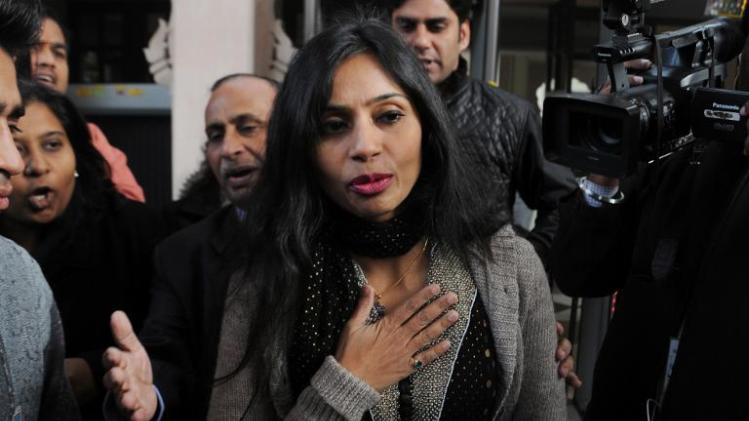Indian diplomat tells of anguish at leaving US without children

New Delhi (AFP) - An Indian diplomat at the centre of a bitter row with the United States told Sunday of her "immense stress" at leaving behind her young family in New York, and vowed to clear her name.
Indian consulate official Devyani Khobragade was allowed to leave the United States on Friday after a month-long dispute over her arrest and strip-search on suspicion of visa fraud involving her domestic servant.
Khobragade was granted full diplomatic immunity and allowed to fly back to India -- just hours after charges were filed in court alleging she lodged false documents to obtain a visa for her servant and then underpaid her.
Khobragade, 39, told an Indian newspaper of her anguish at leaving behind her daughters, aged seven and four, in New York along with her husband, a US citizen, who works as an academic.
"I wonder if I will be able to ever reunite with my family, my husband, my little kids. I miss them," Khobragade told The Sunday Express.
"What if my children choose to study and work in the US? What if I can never return to the US, which I cannot now. Does it mean we will never be able to live together as a family again?" she said.
"I know I am honest, and I will come out clean. But we do not know how much time it will take and for how long my family will have to suffer due to this," she added.
Her arrest on December 12 outside her children's school and treatment in custody, where she said she was subjected to a cavity search, outraged India which claimed she benefited from full diplomatic immunity.
US prosecutors disputed this, and filed charges in New York accusing Khobragade of sometimes forcing the Indian maid to work 100-hour weeks, even when sick and often without a day off, for pay as little as $1.22 an hour.
Khobragade did obtain diplomatic immunity when last week New Delhi asked Washington to grant her a G1 visa given to diplomats at India's UN mission, which is also in New York.
The row between the two countries, which had embraced each other as strategic partners, saw weeks of feisty exchanges that strained bilateral ties and left resentment on both sides.
India has removed extra security barriers at the US embassy in New Delhi, demanded contract details for domestic staff employed by American diplomats and even stopped the mission importing duty-free food and alcohol.
On Wednesday, it ordered an embassy leisure centre popular with American expatriates in the capital to stop admitting non-diplomatic members, while scheduled visits by US officials to India have been cancelled.
In a fresh retaliatory measure late Friday, India asked the United States to withdraw an embassy official in New Delhi.
The expelled American diplomat was a "similar rank" to Khobragade and is thought to have helped the family of her maid travel to America where they were granted protection by prosecutors.
US prosecutors say the family of the maid were evacuated to the United States because of attempts to intimidate them.
In her newspaper interview, Khobragade said she would continue a legal fight to clear her name, including attempting to have her case in New York officially dismissed in a federal court.
"I have come to India but my stand still needs to be vindicated. And of course, I have been separated from my family, and I am under immense stress for my children," Khobragade said.
"I spoke to my kids for hours last night, and they are already missing me. The four-year-old asked me, 'Mommy, when will you be back home', and I had no answer."
She cannot return to the United States unless she surrenders to the court on arrival, and her name is being placed on US immigration watch lists "to prevent the routine issuance of any future visa", according to US officials.



Richard (RJ) Eskow
JPMorgan Chase: "Incredibly Guilty"